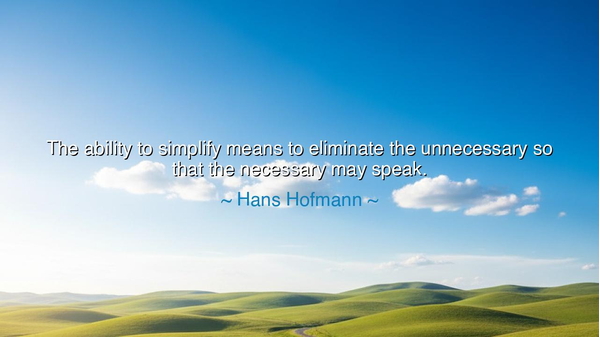
The ability to simplify means to eliminate the unnecessary so
The ability to simplify means to eliminate the unnecessary so that the necessary may speak.






Host: The studio was quiet except for the faint, delicate hum of rain against the tall windows. The floorboards creaked under the weight of creation — canvases leaned in silent rows against the wall, each one whispering something half-finished, half-forgotten. A single lamp burned low, throwing a soft, golden light across the cluttered table — jars of brushes, palettes smeared with the ghosts of color, a cup of coffee long since gone cold.
Jack stood in front of a massive blank canvas, his shirt spattered with paint, his eyes unfocused — as if he were trying to listen to something too quiet for the world to hear. Jeeny sat by the window, a notebook open in her lap, her pen motionless. She watched him — not impatiently, but like someone watching a man mid-prayer.
Outside, the city was blurred and blue, but inside, time had stopped.
Jeeny: softly, almost reverently “Hans Hofmann once said, ‘The ability to simplify means to eliminate the unnecessary so that the necessary may speak.’”
Jack: without turning around “Yeah. Easy for him to say. He painted abstraction for a living. My life’s full of noise.”
Jeeny: smiling faintly “Maybe that’s the point. The noise keeps us from hearing what actually matters.”
Host: Jack dipped his brush into a jar of white paint and dragged it across the canvas in a single, deliberate motion — a whisper of color against emptiness.
Jack: quietly “You ever notice how afraid people are of blank space? They rush to fill it — with sound, with stuff, with words.”
Jeeny: nodding “Because silence feels like exposure. Stillness feels like failure. But maybe that’s where truth hides — in the parts we edit out.”
Host: The rain grew louder — rhythmic, cleansing. Jack stopped painting, stepped back, studying the single white stroke like it was a doorway.
Jack: quietly, more to himself “You think simplicity’s bravery?”
Jeeny: softly “Of course. It takes courage to stop.”
Jack: turning to her now, tired but intrigued “Stop what?”
Jeeny: meeting his gaze “Reaching. Overcompensating. Explaining. Just... letting what’s essential breathe.”
Host: The air between them hummed with the weight of that idea. The lamp flickered, casting long shadows across the wall, the kind that make truth look almost tangible.
Jack: after a pause “You think that applies to art only? Or to life too?”
Jeeny: smiling faintly “Both. Maybe they’re the same thing. The art of living is just the practice of editing.”
Jack: grinning slightly “ing what?”
Jeeny: “Whatever keeps the heart from speaking clearly.”
Host: He looked back at the canvas — the faint white brushstroke now glowing softly in the dim light. It was barely anything, but somehow, it already meant something.
Jack: murmuring “So, simplicity isn’t lack. It’s focus.”
Jeeny: nodding “Exactly. It’s subtraction, not absence.”
Jack: “Funny — we spend most of our lives adding. Possessions, people, distractions.”
Jeeny: “And wonder why we can’t hear ourselves think.”
Host: The rain softened, the kind of hush that feels earned. Jeeny stood and walked over to the table, running her fingers along the edges of his paintbrushes, each one hardened by use.
Jeeny: quietly “You know, Hofmann was right. Simplicity isn’t a technique — it’s a kind of honesty. A way of saying only what you must, and meaning all of it.”
Jack: smiling faintly “You mean like poetry.”
Jeeny: “Exactly. Poetry with restraint. Meaning more by saying less.”
Host: She picked up a small brush, dipped it in a streak of black, and handed it to him. Their fingers brushed — fleeting, but charged.
Jeeny: softly “Try again. But this time, stop before you want to.”
Jack: raising an eyebrow “That sounds like your philosophy on everything.”
Jeeny: grinning “Because it works. The hardest part of mastery is knowing when enough is enough.”
Host: He turned back to the canvas. His movements slowed, intentional now. Every stroke deliberate, every pause an act of trust.
Minutes passed. Then silence. Then the sound of the brush being set down — light, final, reverent.
Jack: without turning “It feels... clean.”
Jeeny: quietly “It feels true.”
Host: The light dimmed as the rain stopped. The world outside shimmered under a new clarity — washed, simplified, renewed.
Jeeny walked closer, standing beside him. They both looked at the painting — sparse, elegant, restrained. It wasn’t loud or ambitious. It was quiet. Complete.
Jeeny: softly “See? The necessary finally spoke.”
Jack: after a pause, with a half-smile “And all it needed was space.”
Jeeny: smiling back “That’s all anything ever needs.”
Host: The camera panned slowly across the studio — the walls lined with half-finished canvases, the light falling softly over tools of creation now still. The hum of the world outside had softened too, as if in reverence for what simplicity had revealed.
And as the scene faded into a long, gentle quiet, Hans Hofmann’s wisdom filled the silence — not as a thought, but as presence:
Simplicity is not emptiness — it’s essence.
It’s the quiet removal of all that distracts from truth.
When we strip away the excess, what remains is the soul — uncluttered, unguarded, alive.
The necessary does not shout; it whispers.
But only those brave enough to silence the noise will ever hear it.






AAdministratorAdministrator
Welcome, honored guests. Please leave a comment, we will respond soon